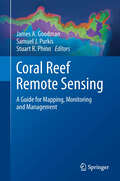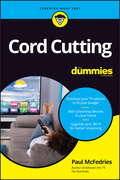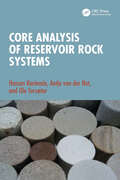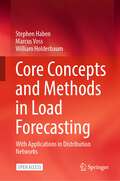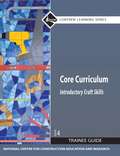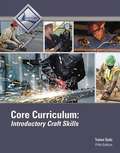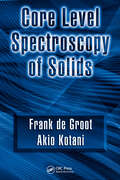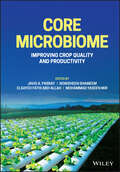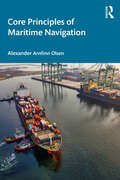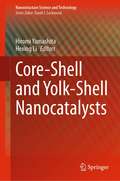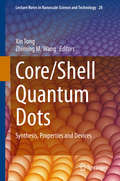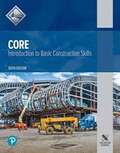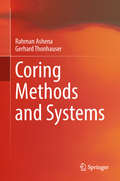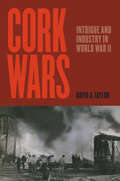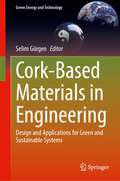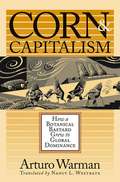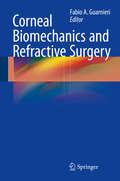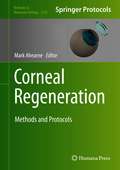- Table View
- List View
Copyright and Popular Media
by Trajce CvetkovskiCopyright governance is in a state of flux because the boundaries between legal and illegal consumption have blurred. Trajce Cvetkovski interrogates the disorganizational effects of piracy and emerging technologies on the political economy of copyright in popular music, film and gaming industries.
Coral Reef Remote Sensing: A Guide for Mapping, Monitoring and Management
by James A. Goodman Samuel J. Purkis Stuart R. PhinnRemote sensing stands as the defining technology in our ability to monitor coral reefs, as well as their biophysical properties and associated processes, at regional to global scales. With overwhelming evidence that much of Earth's reefs are in decline, our need for large-scale, repeatable assessments of reefs has never been so great. Fortunately, the last two decades have seen a rapid expansion in the ability for remote sensing to map and monitor the coral reef ecosystem, its overlying water column, and surrounding environment. Remote sensing is now a fundamental tool for the mapping, monitoring and management of coral reef ecosystems. Remote sensing offers repeatable, quantitative assessments of habitat and environmental characteristics over spatially extensive areas. As the multi-disciplinary field of coral reef remote sensing continues to mature, results demonstrate that the techniques and capabilities continue to improve. New developments allow reef assessments and mapping to be performed with higher accuracy, across greater spatial areas, and with greater temporal frequency. The increased level of information that remote sensing now makes available also allows more complex scientific questions to be addressed. As defined for this book, remote sensing includes the vast array of geospatial data collected from land, water, ship, airborne and satellite platforms. The book is organized by technology, including: visible and infrared sensing using photographic, multispectral and hyperspectral instruments; active sensing using light detection and ranging (LiDAR); acoustic sensing using ship, autonomous underwater vehicle (AUV) and in-water platforms; and thermal and radar instruments. Emphasis and Audience This book serves multiple roles. It offers an overview of the current state-of-the-art technologies for reef mapping, provides detailed technical information for coral reef remote sensing specialists, imparts insight on the scientific questions that can be tackled using this technology, and also includes a foundation for those new to reef remote sensing. The individual sections of the book include introductory overviews of four main types of remotely sensed data used to study coral reefs, followed by specific examples demonstrating practical applications of the different technologies being discussed. Guidelines for selecting the most appropriate sensor for particular applications are provided, including an overview of how to utilize remote sensing data as an effective tool in science and management. The text is richly illustrated with examples of each sensing technology applied to a range of scientific, monitoring and management questions in reefs around the world. As such, the book is broadly accessible to a general audience, as well as students, managers, remote sensing specialists and anyone else working with coral reef ecosystems.
Coral Reefs and Associated Marine Fauna around the Arabian Peninsula
by Najeeb M.A. Rasul Ian C.F. StewartCoral Reefs and Associated Marine Fauna around the Arabian Peninsula is a unique text that contains studies on a diverse range of topics related to the biology of the Red Sea and Arabian (Persian) Gulf region.Containing invited and peer-reviewed chapters, this book is a compilation of the works of various experts in their respective fields. The authors delve into the marine fauna around the Arabian Peninsula, including marine reptiles and mammals, coral reefs, fish, invertebrates, algae and phytoplankton. They also explore the changes resulting from anthropogenic and climate effects.This book will be a helpful resource for researchers in Biology and will also be a valuable reference for anyone interested in the biology of these two warm semi-isolated seas with their unique environments.
Cord Cutting For Dummies
by Paul McFedriesCut the cable television cord and cut your monthly bills Are you one of those people who have 500 television channels to choose from and you can never find anything to watch? Maybe it’s time to cut the cable cord and take full control of what’s on your television. All you need to get started with this popular money saving strategy is an Internet connection, a device to stream to, and the advice in this book. With Cord Cutting For Dummies, you go from evaluating if cord cutting is the right choice for your budget to acquiring the technology to get the programming you actually want. You’ll discover the technology you need for streaming, select the service or services that fit your needs, and make the components of your setup work together—all within your budget. Cord Cutting For Dummies offers the steps to going from wired to wireless, including: Deciding if you need to upgrade your Wi-Fi equipment and service. Evaluating your current devices. Adding a smart TV to the mix. Choosing the best streaming services for you—including some free options When you’re ready to untether yourself from the cable or satellite, Cord Cutting For Dummies shows you, step by step, how to break free. Pick up a copy and you’ll be watching your favorite movie or TV show in no time!
Cordwood Building
by Rob RoyCordwood masonry is an ancient building technique whereby walls are constructed from "log ends" laid transversely in the wall. It is easy, economical, aesthetically striking, energy-efficient, and environmentally sound.Cordwood Building collects the wisdom of more than 25 of the world's best practitioners, detailing the long history of the method, and demonstrating how to build a cordwood home using the latest and most up-to-date techniques, with a special focus on building code issues.Author/editor Rob Roy has been building, researching, and teaching about cordwood masonry for 25 years and, with his wife, started Earthwood Building School in 1981. He has written 10 books on alternative building, presented four videos--including two about cordwood masonry--and has taught cordwood masonry all over the world.
Core Analysis of Reservoir Rock Systems
by Hassan Karimaie Antje van der Net Ole TorsæterCore analysis is an essential source of quantitative data on reservoir properties. These data are used for modeling the distribution and flow of oil and gas reservoirs, CO2 and hydrogen storage, and flow behavior in geothermal reservoirs. While several books cover core analysis for practitioners, this book fills a gap through introducing laboratory equipment and procedures used in core analysis and the theoretical aspects of the parameters. It offers detailed instructions on experimental execution for those with limited or no experience including risk analysis for high safety. Emphasizes the basic characterization of porous materials for multiphase flow, specifically consolidated natural materials Features methods commonly used in the special core analysis within the oil and gas industry, extending to the emerging field of gas storage with occasional references to research-oriented equipment Offers detailed descriptions of laboratory exercises and instructions on data analysis suitable for student work Includes solutions to some exercises to demonstrate the application of measured parameters in reservoir evaluation Provides a unique combination of brief discussions on the basic theory of parameters, explanations of experimental principles, detailed experimental procedures according laboratory standards, and data analysis, with multiple laboratory-related example problems This concise and practical workbook is written for everyone interested in practical measurements of parameters needed for analysis of fluid flow in porous media, specifically students, or for starting staff in the laboratory, preferably with a background in geosciences or fluid mechanics or related topics.
Core Concepts and Methods in Load Forecasting: With Applications in Distribution Networks
by William Holderbaum Stephen Haben Marcus VossThis comprehensive open access book enables readers to discover the essential techniques for load forecasting in electricity networks, particularly for active distribution networks.From statistical methods to deep learning and probabilistic approaches, the book covers a wide range of techniques and includes real-world applications and a worked examples using actual electricity data (including an example implemented through shared code). Advanced topics for further research are also included, as well as a detailed appendix on where to find data and additional reading. As the smart grid and low carbon economy continue to evolve, the proper development of forecasting methods is vital. This book is a must-read for students, industry professionals, and anyone interested in forecasting for smart control applications, demand-side response, energy markets, and renewable utilization.
Core Curriculum: Introductory Craft Skills
by National Center for Construction Education ResearchThis exceptionally produced trainee guide features a highly illustrated design, technical hints and tips from industry experts, review questions and a whole lot more! Nine modules in all provides coverage of: Basic Safety, Introduction to Construction Math, Introduction to Hand Tools, Introduction to Power Tools, Construction Drawings, Basic Rigging, Basic Communication Skills, Basic Employability Skills, and Introduction to Materials Handling.
Core Curriculum: Introductory Craft Skills Trainee Guide (Fifth Edition)
by Nccer<p>Welcome to the world of construction! Construction is one of the largest industries, offering excellent opportunities for high earnings, career advancement, and business ownership. <p>Work in construction offers a great variety of career opportunities. People with many different talents and educational backgrounds--skilled craftspersons, managers, supervisors, and superintendents--find job opportunities in construction and related fields. As you will learn throughout your training, many other industries depend upon the work you will do in construction. From houses and office buildings to factories, roads, and bridges--everything begins with construction. <p>This exceptionally produced trainee guide features: Basic Safety, Introduction to Construction Math, Introduction to Hand Tools, Introduction to Power Tools, Introduction to Blueprints, Basic Rigging, Basic Communication Skills, Employability Skills, and more.</p>
Core Level Spectroscopy of Solids (Advances in Condensed Matter Science)
by Frank de Groot Akio KotaniCore level spectroscopy has become a powerful tool in the study of electronic states in solids. From fundamental aspects to the most recent developments, Core Level Spectroscopy of Solids presents the theoretical calculations, experimental data, and underlying physics of x-ray photoemission spectroscopy (XPS), x-ray absorption spectroscopy (XAS), x
Core Microbiome: Improving Crop Quality and Productivity
by Mohammad Yaseen Mir Nowsheen Shameem Javid A. Parray Elsayed Fathi Abd-AllahImprove the quality and productivity of your crops through selecting positive and effective interactive core-microbiomes As microbial cells are present in overwhelming numbers in our soil, it is perhaps inevitable that microbes are found extensively in plant and animal tissue. The role of microbiomes on the regulation of physiological processes in animals has been extensively researched in recent years, but the overarching role of the plant microbiome has yet to be discovered. Core Microbiome: Improving Crop Quality and Productivity is an attempt to remediate some of that deficit, as the first book to summarize feature of microbial communities that make up the plant microbiome. There is substantial evidence that these communities are crucial in disease control, enhanced nutrient acquisition, and stress tolerance—a feature more important than ever due to climate change. A further focus on improving how core microbiomes interact so that they are both phenotypically and genotypically very adaptive and sustainable will allow the reader to improve the quality and productivity of crops so that they may be considered sustainable agriculture. Core Microbiome readers will also find: Descriptions of the basic structure of core microbiomes and their functions across various habitats New and cutting-edge trends and technological innovations highlighted that use core microbiomes to harness plant microbiome interaction The structure, classification, and biotechnological applications of aquatic core microbiomes, in addition to the material on plant microbiomes As a broad introduction to the interaction of core microbiome and plant productivity, Core Microbiome is ideal for researchers and scientists working in the field of environmental science, environmental microbiology, and waste management. Similarly, undergraduate and graduate students in these fields, as well as in agriculture, biotechnology, biosciences, and life and environmental sciences will also benefit from this work.
Core Principles of Maritime Navigation
by Alexander Arnfinn OlsenCore Principles of Maritime Navigation introduces the main navigation concepts required by trainees and professionals involved in maritime operations. The book covers a wide range of subjects from wind, waves and depths to navigational marks and buoys, navigational techniques and equipment, passage planning, duties of the Officer of the Watch, berthing and anchorage. It is not intended to be a technical publication; rather, it aims to introduce core ideas and concepts in an accessible way for general readers, university students, cadets and for the continuous professional development of experienced seafarers.
Core-Shell Nano Constructs for Cancer Theragnostic: Current Scenario, Challenges and Regulatory Aspects
by Jayvadan K. Patel Namdev Dhas Gaurav Kant SaraogiThis book addresses the critical challenge in cancer treatment, focusing on the precise delivery of therapeutic agents to cancer cells while sparing healthy tissue. It emphasizes the limitations of current cancer therapies and highlights the potential of nanotechnology to revolutionize cancer treatment. It discusses how core-shell nano constructs, with their enhanced stability, biocompatibility, and targeting capabilities, emerge as a promising solution. The book covers the synthesis of novel core-shell nano constructs while elaborating on the chemistry involved in their fabrication. It explores various therapeutic and diagnostic applications of these nano constructs in cancer treatment, considering different materials such as polymers, lipids, and metals and the importance of diagnostics, biosensors, and targeting strategies to achieve site-specific delivery while minimizing toxicity to healthy cells. Additionally, the book addresses regulatory and commercialization aspects,emphasizing the need for comprehensive characterization techniques to assess the effectiveness of core-shell nano constructs. This book is an invaluable resource for students, researchers, and professionals in the field.
Core-Shell and Yolk-Shell Nanocatalysts (Nanostructure Science and Technology)
by Hiromi Yamashita Hexing LiThis book introduces recent progress in preparation and application of core-shell and yolk-shell structures for attractive design of catalyst materials. Core-shell nanostructures with active core particles covered directly with an inert shell can perform as highly active and selective catalysts with long lifetimes. Yolk-shell nanostructures consisting of catalytically active core particles encapsulated by hollow materials are an emerging class of nanomaterials. The enclosed void space is expected to be useful for encapsulation and compartmentation of guest molecules, and the outer shell acts as a physical barrier to protect the guest molecules from the surrounding environment. Furthermore, the tunability and functionality in the core and the shell regions can offer new catalytic properties, rendering them attractive platform materials for the design of heterogeneous catalysts. This book describes the recent development of such unique nanostructures to design effective catalysts which can lead to new chemical processes. It provides an excellent guide for design and application of core-shell and yolk-shell structured catalysts for a wide range of readers working on design of attractive catalysts, photocatalysts, and electrocatalysts for energy, environmental, and green chemical processes.
Core/Shell Quantum Dots: Synthesis, Properties and Devices (Lecture Notes in Nanoscale Science and Technology #28)
by Zhiming M. Wang Xin TongThis book outlines various synthetic approaches, tuneable physical properties, and device applications of core/shell quantum dots (QDs). Core/shell QDs have exhibited enhanced quantum yield (QY), suppressed photobleaching/blinking, and significantly improved photochemical/physical stability as compared to conventional bare QDs. The core-shell structure also promotes the easy tuning of QDs’ band structure, leading to their employment as attractive building blocks in various optoelectronic devices. The main objective of this book is to create a platform for knowledge sharing and dissemination of the latest advances in novel areas of core/shell QDs and relevant devices, and to provide a comprehensive introduction and directions for further research in this growing area of nanomaterials research.
Core: Introduction To Basic Construction Skills
by NccerCore: Introduction to Basic Construction Skills 6th Edition
Coring Methods and Systems
by Gerhard Thonhauser Rahman AshenaThis book is a practical guide to downhole rock sampling and coring concepts, methods, systems, and procedures for practitioners and researchers. Its chapters are based upon years of extensive studies and research about the coring methods and via direct and continuous communication and consultation obtained from various service and operator companies such as Baker Hughes GE, NOV, OMV, and Sandvik. The contributors discuss the state-of-the-art coring methods and systems (mainly used in the petroleum industry), which include: · conventional coring; · wireline continuous coring; · invasion mitigation coring (low invasion, gel coring, sponge coring); · jam-detection, anti-jamming, full closure; · safe-coring and tripping; · oriented-coring; · pressure/in-situ coring; · logging-while-coring; · motor coring; · mini-coring; · coiled Tubing Coring; and · underbalanced coring. The contributors provide practical and applicable understanding of the procedures of these coring methods and systems, as well as the specific core barrel components, working mechanisms, and schematics of the tools and processes used. Because Coring Methods and Systems analyses and compares the core barrels used in both petroleum and mining industries, it enhances the communication and may allow knowledge transfer between the two industries. As core damage is a serious issue during coring and handling jeopardizing correct calibration of exploration data, Coring Methods and Systems has greatly focused on its identification and its mitigation. Therefore, it can be used as an ideal source for geologists, core analysts, and reservoir engineers, to ensure the retrieval of high-quality cores.
Coriolis Vibratory Gyroscopes: Theory and Design
by Vladislav ApostolyukThis book provides the latest theoretical analysis and design methodologies of different types of Coriolis vibratory gyroscopes (CVG). Together, the chapters analyze different types of sensitive element designs and their kinematics, derivation of motion equations, analysis of sensitive elements dynamics in modulated and demodulated signals, calculation and optimization of main performance characteristics, and signal processing and control. Essential aspects of numerical simulation of CVG using Simulink® are also covered. This is an ideal book for graduate students, researchers, and engineers working in fields that require gyroscope application, including but not limited to: inertial sensors and systems, automotive and consumer electronics, small unmanned aircraft control systems, personal mobile navigation systems and related software development, and augmented and virtual reality systems.
Cork Wars: Intrigue and Industry in World War II
by David A. TaylorThe surprising story of cork and its critical role in US security and the war effort.Winner of the IPPY Book Award History (World), Silver of the Independent PublisherIn 1940, with German U-boats blockading all commerce across the Atlantic Ocean, a fireball at the Crown Cork and Seal factory lit the sky over Baltimore. The newspapers said that you could see its glow as far north as Philadelphia and as far south as Annapolis. Rumors of Nazi sabotage led to an FBI investigation and pulled an entire industry into the machinery of national security as America stood on the brink of war. In Cork Wars, David A. Taylor traces this fascinating story through the lives of three men and their families, who were all drawn into this dangerous intersection of enterprise and espionage. At the heart of this tale is self-made mogul Charles McManus, son of Irish immigrants, who grew up on Baltimore’s rough streets. McManus ran Crown Cork and Seal, a company that manufactured everything from bottle caps to oil-tight gaskets for fighter planes. Frank DiCara, as a young teenager growing up in Highlandtown, watched from his bedroom window as the fire blazed at the factory. Just a few years later, under pressure to support his family after the death of his father, DiCara quit school and got a job at Crown. Meanwhile, Melchor Marsa, Catalan by birth, managed Crown Cork and Seal’s plants in Spain and Portugal—and was perfectly placed to be recruited as a spy. McManus, DiCara, and Marsa were connected by the unique properties of a seemingly innocuous substance. Cork, unrivaled as a sealant and insulator, was used in gaskets, bomber insulation, and ammunition, making it crucial to the war effort. From secret missions in North Africa to 4-H clubs growing seedlings in America to secret intelligence agents working undercover in the industry, this book examines cork’s surprising wartime significance. Drawing on in-depth interviews with surviving family members, personal collections, and recently declassified government records, Taylor weaves this by turns beautiful, dark, and outrageous narrative with the drama of a thriller. From the factory floor to the corner office, Cork Wars reflects shifts in our ideas of modernity, the environment, and the materials and norms of American life. World War II buffs—and anyone interested in a good yarn—will be gripped by this bold and frightening tale of a forgotten episode of American history.
Cork Wars: Intrigue and Industry in World War II
by David A. Taylor“This well-researched, well-told story takes readers into a world of espionage, industrial ingenuity, and American resilience . . . a compelling history.” —Robert Whitaker, author of Anatomy of an EpidemicSilver Medal Winner of the Independent Publisher Book Award for History (World)In 1940, with German U-boats blockading all commerce across the Atlantic Ocean, a fireball at the Crown Cork and Seal factory lit the sky over Baltimore. Rumors of Nazi sabotage led to an FBI investigation and pulled an entire industry into the machinery of national security as America stood on the brink of war.In Cork Wars, David A. Taylor traces this fascinating story through the lives of three men and their families: Charles McManus, who ran Crown Cork and Seal, a company that manufactured everything from bottle caps to oil-tight gaskets for fighter planes; Frank DiCara, who watched the fire blazed at the factory and got a job at Crown just a few years later; and Melchor Marsa, who managed Crown Cork and Seal’s plants in Spain and Portugal—and was perfectly placed to be recruited as a spy.Drawing on in-depth interviews with surviving family members, personal collections, and recently declassified government records, Taylor weaves this by turns beautiful, dark, and outrageous narrative with the drama of a thriller. From the factory floor to the corner office, Cork Wars reflects shifts in our ideas of modernity, the environment, and the materials and norms of American life. World War II buffs—and anyone interested in a good yarn—will be gripped by this bold and frightening tale of a forgotten episode of American history.“An absorbing and illuminating read.” —Maury Klein, author of A Call to Arms
Cork-Based Materials in Engineering: Design and Applications for Green and Sustainable Systems (Green Energy and Technology)
by Selim GürgenCork-Based Materials in Engineering Applications provides a set of case studies investigating cork as an eco-friendly and sustainable engineering material. This natural material has had limited applications in engineering until recent years. Recent regulations by European authorities calling for reducing environmentally hazardous and non-recyclable materials have increased interest in cork-based science. Contributors look at cork-based engineering applications, including crashworthiness applications, anti-impact structures, energy-absorbing systems, and vibration-damping devices. Researchers, scientists, students, and practicing engineers working in advanced materials and natural composites will find this unique book an invaluable reference and introduction to the world of cork-based materials and applications.
Corn All Year
by Kathleen Weidner ZoehfeldSpringtime means it's time to plant corn in the fields again. In September, it's ready to harvest.
Corn and Capitalism
by Arturo WarmanExploring the history and importance of corn worldwide, Arturo Warman traces its development from a New World food of poor and despised peoples into a commodity that plays a major role in the modern global economy.The book, first published in Mexico in 1988, combines approaches from anthropology, social history, and political economy to tell the story of corn, a "botanical bastard" of unclear origins that cannot reseed itself and is instead dependent on agriculture for propagation. Beginning in the Americas, Warman depicts corn as colonizer. Disparaged by the conquistadors, this Native American staple was embraced by the destitute of the Old World. In time, corn spread across the globe as a prodigious food source for both humans and livestock. Warman also reveals corn's role in nourishing the African slave trade.Through the history of one plant with enormous economic importance, Warman investigates large-scale social and economic processes, looking at the role of foodstuffs in the competition between nations and the perpetuation of inequalities between rich and poor states in the world market. Praising corn's almost unlimited potential for future use as an intensified source of starch, sugar, and alcohol, Warman also comments on some of the problems he foresees for large-scale, technology-dependent monocrop agriculture.
Corneal Biomechanics and Refractive Surgery
by Fabio A. GuarnieriThis book presents a unique approach not found in any other text for those looking to improve the clinical results of refractive surgery by gaining a better understanding of corneal biomechanics and the instrumentation related to it. Written by leading experts in the field, this book provides authoritative coverage of the interactions of the cornea and the bioinstrumentation, such as corneal topography, pachymetry, aberrometers, tonometry and optical coherence tomography. Organized in an easy-to-read manner, Corneal Biomechanics and Refractive Surgery is designed for refractive surgeons and general ophthalmologists alike and describes the biomechanical role of the corneal tissue and how each part is affected in refractive surgery. Additionally, showing what the bioinstrumentation can measure, how models can improve understanding of the interaction between biomechanics, bioinstrumentation, and refractive surgery, and how these models and bioinstrumentation together can improve the refractive results, are also discussed.
Corneal Regeneration: Methods and Protocols (Methods in Molecular Biology #2145)
by Mark AhearneThis volume details different laboratory techniques used to develop regenerative therapies that help treat corneal blindness. Chapters guide readers through methods and protocols on optimal cell culture conditions, gene-editing techniques, multiple types of scaffold for corneal regeneration, how to evaluate the success of these therapies, and cell and material characterization techniques. Written in the highly successful Methods in Molecular Biology series format, chapters include introductions to their respective topics, lists of the necessary materials and reagents, step-by-step, readily reproducible laboratory protocols, and tips on troubleshooting and avoiding known pitfalls.Authoritative and cutting-edge, Corneal Regeneration: Methods and Protocols aims to be useful for new and experienced laboratory researchers working on different aspects of corneal regeneration.

